A few things to note, especially for the non-Ghanaian reader:

The most popular political parties in Ghana are two, the National Democratic Congress (NDC) and the New Patriotic Party (NPP). With red, white, black and green as its party colours, the NDC’s logo is an umbrella with the head of what looks like an eagle as its pointed top end. NPP has blue and also, read and white as party colours, and an elephant for a logo.
Another party, the Convention People’s Party (CPP), has a cock as its logo.
Photo Credit

Towards the 2008 elections, NDC’s mantra was ‘let us change or we are changing’ and that of the NPP was ‘let us go/move forward or we are moving/ going forward’. Besides this, ‘I believe in Ghana’ is associated with the NPP, because Nana Addo Dankwa Akuffo-Addo, the then flag-bearer of the party ‘ued’ it a lot in speeches. With J. A. Kufuor having served the maximum two four-year terms as president, per the constitution, the current President, Nana Addo was the NPP’s chosen flag-bearer, in Kufuor’s stead. Previously, in 2000, Flt Lt J. J. Rawlings, ((arguably (a)) founder of the NDC, had also completed his constitutional two four-year terms. The immediate former President before Kufuor’s final tenure had been Rawlings.
Photo credit
The late Prof. J. E. Atta Mills, the then flag-bearer and later, the winner of the 2008 elections, had been a Vice President of Rawlings. Recent former President, J. D. Mahama, had been slated to be Mills’ vice president.Around 2008, and with Kufuor as president, Ghana’s currency, the Cedis, was re-denominated and re-named Ghana Cedis. The new coins and notes were nicknamed Kufuor coins, and Kufuor Cedis – or even Kufuor Dollar – respectively.


Bank Note: Photo Credit
Coin: Photo Credit
* * *

There were more than two political parties in Ghana at the time, but the whole country was split into two, mainly, long before and after the elections. With craned neck locked under a load, the sweating kayayoo (somewhere in the country’s capital) had to wade her way through people who were either moving forward or changing.
The rickety old man in some village (which Google Maps has no clue of) was sure that his decrepit transistor radio was changing because its screeches and hitches from political arguments were moving forward.
Photo Credit
The Ghanaian was forced to decide, to either be here or there. And whether it was sad or true or both,all those who chose the apparently non-existent middle ground had to always have ready reasons why they have chosen to make ‘Walking Jokes’of themselves. As much as these Jokers were eligible voters, their number was not very significant.
There will also always be the famous, fishy Floating Voters. These are never decided about whether it is there they are or if it is here they will rather be, and then hopefully, settle in their choice. Maybe the Floaters were confused, but certainly, they held more promise for adding to the numbers of either side, unlike the annoying, wasteful Jokers. For the Floaters, it seemed, only needed a little convincing or shoving, whereas the Jokers were so depressingly clueless that they did not even realize so, and therefore, could hardly be helped. Not by even God Himself. Perhaps.
Photo Credit

So it happened that party people variously put their lines and acts together and performed better than could have been spelt out in an actual script – if any at all. They were so great at the theatric(k)s of politicking that it all was near second nature to them. This party people, they upped the noise from their end of the world at every opportunity, on every wave and space on every medium, through every fair or not-so-foul means. Some party people took all these too personal and even, as full-time jobs –actually, life-time jobs, for some more others.
Altogether, their zeal was unmatched, not even by the presidential and parliamentary candidates themselves, the ones who needed the votes as if they could or would die or kill – in the real and in no-so-literal sense of things.
In the bid to woo (or if you will, win) all the Floaters and possibly, some Jokers too, party billboards and paraphernalia followed Ghanaians into their very living rooms. A Ghanaian could not have a little entertainment on TV without being jolted with well-meant chunks of advice. Suddenly, the usual loud talk-upon-speech and actively-doing-nothing of a politics changed into the clanging of propaganda and trumpeting of pledges-upon-promises.

All the while, the media let itself get flooded with the droning wail of everyone but one’s own self beseeching, begging everyone else to either help push the elephant back to the forest where it belonged or beware the sheep engendered by the fox. As the drama moved forward, towards its climax, the day for the presidential elections, the more taut and tense things and tides turned.
Photo Credit
And if you are Ghanaian and are still not lucky enough, you will see anyone from a worried orphan who just completed junior high school and a tenant with rent issues; through a farmer who lost his backyard farm to rats and an unemployed university graduate; to your neighbour! who suddenly lost job and all but his name, the last time power decided to change political hands. Again, there will almost always be the latest person who fell out of a party because s/he got fed up (of course, you are free to read fed up as simply fired) and has now vowed to only go forward, by joining an-other party, the one party which hitherto, s/he had been too blind or brainwashed or bewitched or all to have known as the only, true, clean party.
But you cannot have run out of all luck until you see someone who could have been your pastor, mentor, chief – or is it king? – a respected academician, statesman or you-know-what-I-mean on the TV, explicitly telling you where to stamp your thumb, come that day.
 And per one thread of the freely flying chunks of advice, the recommended presidential candidate is God’s-own-chosen-one-cum-the-king-of-peace.
And per one thread of the freely flying chunks of advice, the recommended presidential candidate is God’s-own-chosen-one-cum-the-king-of-peace.
Not heeding this strain of advice is tantamount to fighting God, His Person, will and all, and worst of all,to trapping oneself in an eternal hell of hardships of all shades and weights.
Photo Credit
Per the other thread, you are admonished to vote for the presidential candidate who was said to be God-sent, the long-awaited messiah, a man who was and is his own man. On refusing this other advice, one is told to then prepare to live through the mediocre, (a)pathetic leadership of the acclaimed king-of-peace, who would only end up as a puppet for the soon-to-exit-the-stage guy, the same guy who, obviously will, run the show from behind the curtains, well after the elections.
The die-or-do nature of this dilemma often forced me to pause and ask myself:
Can making a decision between ONLY two alternatives be any harder
if one is to also choose between God’s chosen one and God’s sent one?
What is the difference between being God’s chosen one and sent one? Anyway?
The more I asked, the more questions poured in:
Can even God Himself be blamed if He finds it hard
to decide between such alternatives?
For His name has now, suddenly, become that ready, easy label
that adds the final flourish for every truth and lie and everything in between
that is produced and packaged for popular appeal and mass consumption.
Come on…can this same God be blamed
that He is too merciful- maybe, lenient to a fault- for allowing folks
who hitherto, have never been his ‘friends’ to go bandying and attaching
His Name to everything and everyone they needed to promote- to the people,
just to gain power?
And my answer, in keeping with what the typical Ghanaian is notoriously known for, was another question and some:
When will all this change stop? When will we, as a nation, go forward see progress?
The non-partisan citizens who took care to avoid all the noise would have their children return from school amused, jumping, singing, ‘Atta Mills and John Mahama…NDC o-o-h deendei…’ And just when this folk begin wondering what it was that their children were learning in school these days (whether from teachers or other children), the neighbours’ children would start chanting and dancing in return, ‘Na-na- na Nana e-e-e-i, ɔyɛ winner…’
Add this to the fact that these decidedly stone age kind of citizens soon found that even with their newly (read suddenly) being very, and sometimes ,overly particular about the colour of clothes they chose to wear to work and ‘play’, they are inevitably caught up in the craze of the new age, the not-exactly-few days to the elections proper. They cannot be faulted. They cannot be too careful. For it is in such times that wearing anything with white or red anywhere is safe until any hue of blue or green and black so much as peeps from elsewhere among the clothes on your body.
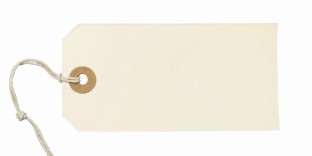 Your name, status, reputation and some, can, within the click of a tongue, be beaten down into the typical three-letter abbreviation of a political party’s name.
Your name, status, reputation and some, can, within the click of a tongue, be beaten down into the typical three-letter abbreviation of a political party’s name.
Say, NCP. You become, are judged and are labeled, you are related to,suddenly, as a party, as here or there.
You cease to be another citizen, a person, even. Just like that.
Photo Credit
All this while, the market mummies continued to bring in and smear foodstuffs at every foot space at the Agbogboloshie market. The Makola women opened their fat stores. You could still buy anything from pen and machete to pawpaw and insecticide in traffic. The kenkey and kelewele sellers were the stubborn ones: at night, they remained planted by the roadsides, with their signature kerosene or rechargeable lamps, waiting for you to do the moving, towards them. At day times, nothing changed: hawking and shouting their services or job-titles, the wɔma doctor, shoeshine and adieyie, were always a return shout away.
Above all else, the sun continued to rise from the east. And the cock crowed.
It is when you board trɔtrɔ and are quick and eager to argue with the mate over the correct fares and changes (pun not intended, cannot be helped), it is only when you surprise yourself by bargaining over a packet of matches and one of your Kufuor coins stealthily falls off you and evaporates, that the decision to change or move forward stares hard at you, squarely in the face.And it is when you are jolted into the realization that common koobi and salt and kontomire have long moved on ceased from being the timelessly cheapest of all cheap food items, that you finally catch on to the changing and moving forward reality.
As if all this was not stir enough, some more people joined sides, other public figures who were not supposed to – or at least, not exactly expected to – openly take sides, but did, damning the consequences. Maybe, they forgot that although they had the right to do so, Ama Ghana was still nursing Democracy, her banoma. While some popular musicians also took sides, individual and grouped others made it up by flooding every available space on the airwaves with peace songs. As if.
All this while, Ama Ghana was at her somewhere, standing, akimbo, discerningly watching some and all, peace songs and all. She kept smiling, saying to herself, ‘The thought of war!’
War.
The closest thing like that had happened up north at Bawku, and people had their own versions and opinions about that. Everything died down sooner than it was feared. Random others also happened, but they only simmered, really, not really boiling past lid and toppling peace pot. Sometimes, one could not tell if some of these random ones had anything to with the upcoming elections proper or if they were little jokes which never remained that cute.
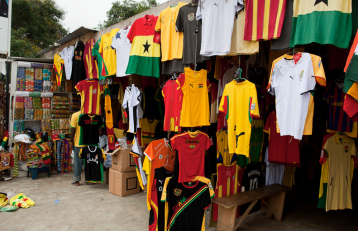 Like this story of this young man who went seesawing on a motorbike and shouting ‘Yɛ kɔ y’enim’, around the Rawlings Park at Accra?Oh, he was lynched like a thief would have been, for outstepping his boundaries, Kantamanto, with his unwanted opinion in the air.
Like this story of this young man who went seesawing on a motorbike and shouting ‘Yɛ kɔ y’enim’, around the Rawlings Park at Accra?Oh, he was lynched like a thief would have been, for outstepping his boundaries, Kantamanto, with his unwanted opinion in the air.
At the mere sound of the place’s name, any sensible person who is on the ‘We are going forward’ side of things, and happens to have any business to do around Rawlings Park, knows to nicely tuck his/her opinion away.
Kantamanto: Photo Credit
In less than thirty minutes after the lynching, the story continued,all manner of business in Accra’s biggest inner-city business centre swiftly moved forward, smoothly,as always. Nothing changed.
Finally, 7th December, 2008, came and left. Like any other day? Almost.
I sat in a trɔtrɔ bound to Achimota on the 8th of December 2008. There was heated talk, based on the ballots counted so far, about who seemed to be winning the elections. I was busily smiling at the thinking patterns of some of the passengers on board. And there was this lady sitting right beside me. She was too quiet to be tickled by all the insinuation and insult-laced words flying in the already crammed oven of a vehicle.Once in a while, the driver called for silence – so that he could concentrate on his driving?The more the driver called, the more petrol the mate poured to fuel the raging argument.
We were all therefore surprised that this quiet lady was the one to end it all, to the driver’s delight. All she said was ‘Naa Nana. Naa Shock!’, to wit, in Ga, ‘Behold Nana. Behold shock!’ A man who seemed infuriated, not just at the abrupt end of the argument, but more at the (pain of) lady’s comment unintentionally stepped on the lady’s toes while he was alighting at his destination.
 I could imagine how this man would further vent his hurt self on his wife at home. His wife would pass the venom on to the house help, and the house help, to the child. The child,to the dog.
I could imagine how this man would further vent his hurt self on his wife at home. His wife would pass the venom on to the house help, and the house help, to the child. The child,to the dog.
And with the dog, most likely, being the least in the hierarchy of things, and especially being an underdog, Ama Ghana can still, always, afford peace, intact and resounding.
After all, the worst (under)dogs can do is to sulk and whine whilst licking their wounds and sniffing dust.
Station: Photo Credit
My younger sister came back from school to tell of the riots at Radio Gold, in Accra. A day after the run-off of the elections, an acute curfew was reported at the Accra Tema Station. And some other parts of the country. I did not know what to think, but I believed war was just not part of Ama Ghana’s nature. Yes, I believed in her that much. And so did her premier university, the University of Ghana, Legon.

Photo Credit
No examination was scheduled for the 7th of December, 2008. A day was allowed before and after that day to enable students and other stakeholders to go exercise their franchise at their respective polling stations across my Ama Ghana. After the day after, the university’s semester examinations were expected to move forward in full force, unless of course, a student wanted the Academic Affairs Directorate to have a change of mind about his/her pending degree.
Perhaps, those of us who were gullible enough to be that positive were also discerning enough to have caught the revelation of the political in-equation going on at the time. By factoring our attitude, positive into the equation there was:
(Positive) change = moving forward ≠ goingback
And upon this, I had a vision in which I saw Egya Nkrumah telling Ama Ghana that he had been right after all to have said, ‘Forward ever, backwards never.’Ama barely looked Egya’s way. She continued teaching her children the chorus of a new song she had just taught them:
 Photo Credit
Photo Credit
We are one people agreeing not to go back.
We are one people agreeing not to go to war.
On that 7th December, after returning from church, I went to vote for the very first time in my young life. Oh yes, I did go to church on that day. And it was a Sunday too. In his sermon that day, I remembered my pastor say‘Anything…everything is possible…’ I was about adding the ‘…with God’ bit, in my mind, when I realized that God, for the first time was not in the picture my pastor was rolling out:
‘Don’t listen to the noise.
People asking and buying other people to vote for a particular person.
People swearing by rivers and thunders that they will vote for a particular candidate.
At the end of the day, no matter who wins or loses,
no one knows who you and I voted.Or who we did not vote for.
Only the Voter knows.
And I tell you, anything can happen in the few seconds or minutes you spend in the voting booth.
You can easily change your mind. About who to vote for.
Even if you have already decided…’
And exactly that happened to me, only it was for some strange, silly, reason. See, I am a die-hard lover of any food made from maize– whatever form and shape, and whatever sauce or soup or what-not it comes with. Amongst the lot, banku and kenkey remain contenders for the topmost position. So fearing that my pre-determined party’s logo, an animal of the avian family, will chop all the corn in Ghana,should its party attain political power, I changed undid my mind. I refused to vote for that party’s presidential candidate. And not knowing who to vote for then, I asked Ama Ghana to show me who to vote for. I was not sure I heard her reply right. So I told myself to vote for the winner. And the winner, Ama Ghana, I voted for.
I remember the evening I jumped for joy and sat right in the middle of a road somewhere in Accra. Accompanying my joy-full jump was a shout, ‘I am proud to be Ghanaian! God bless my homeland Ghana!’
 No, I had not meant to be mad. Poor me had only been too raw and mad with happiness: Ghana had just scored a goal in the then African Cup of Nations.
No, I had not meant to be mad. Poor me had only been too raw and mad with happiness: Ghana had just scored a goal in the then African Cup of Nations.
And God knows it was beloved kenkey I was going to buy when shouts of the goal poured from drinking bars and living rooms and kiosks – any space blessed with a TV and electricity – onto that road!
A car had to honk me out of the euphoria, and out of the middle of that Orgle Road.
Proud me only felt positively silly, and no remorse. No shame.
Photo Credit
Things were not this theatric after the final results of the elections were announced and Ama Ghana won. She sure did win. The war against war. And I did not regret being a little worryingly crazy about a country that rewards a fully eligible voter who was as naïve as a ten year old with such victory. Jesus rightly said so:
‘Let the little children come unto me, for such is the government kingdom…’
Once again, in a vision, I saw Ama Ghana, kneeling and just about ending a prayer:
‘…and my Lord Yesu Kristo, if thou wouldst but borrow thy humble handmaid some of thy words, I shall say unto my beloved sons and daughters, “Believe in God, believe also in…Ghana.”’
But for the smart, frisky edge of her outfit – maybe because she was kneeling and was lost in prayer - Ama looked like her Ghana(ian) self. Enough, at least.
But after the prayer, Ama Ghana lifted herself, stood up and high, fashionably dusted and straightened out her-self and outfit. Suddenly, she had this air of someone who had NOT just recently finished a prayer. And God,it seemed,was in some kind of agreement with – approval of, even – her. Her knowing smile had acquired a cunning slant. As for the spanking sassiness of her outfit, it was so saucy, too shocking, and armed to make one laugh and lament and hail her, all at the same time.
And just when (wo)man thought to try and make do with Ama’s latest taste in fashion – read decision – as loudly spelt out by her outfit, she strutted away from prayer and from view, she dripped with the tongue-in-cheek, dead indifferent attitude.
And just when (wo)man was trying to figure how to live in tune with Ama’s new-found vibe, she strutted away, NOT dressed in the usual, the NORMAL kaba and slit, but sporting a sizzling hot skirt and blouse.
Oh! And see me still believe in Ghana.♦
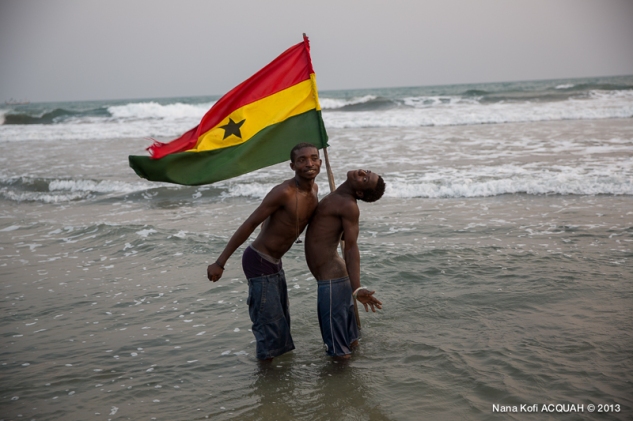
Proudly Ghanaian: Photo Credit
* * *
Glossary:
adieyie – a seamstress/tailor who, rather than sew new ones, fixes torn, loose, tight etc.clothes.
Ama – a day name for a Saturday-born female.
banku – a stir-boiled meal made of (a mixture of cassava dough and) slightly fermented corn dough; eaten with pepper sauce or soup or stew.
banoma – a step-child: a child from one’s spouse/partner’s previous relationship/ marriage.
deendei – exclamatory word for heartfelt, excited welcome.
Egya – a term of endearment for a father (figure).
kaba and slit – a traditional blouse and long skirt sewn from the same print fabric.
kayayoo – a head porter, usually a female.
kelewele – fried dices of spicy, ripe plantain; eaten as finger food.
kenkey – fermented corn dough balled, wrapped in corn husks or plantain leaves and boiled; eaten with fish and pepper sauce or with stew or soup.
koobi – dried salted fish, usually tilapia.
kontomire – cocoyam leaves.
Makola is close to Rawlings Park, as Kantamanto is to Agbogboloshie. Closely knitted with others like Cow Lane and Kimbu, these form the heart of the biggest business city in Accra, Ghana’s capital.
mate – a conductor for a commercial vehicle.
skirt and blouse – the election outcome in which the elected president and the majority of elected parliamentarians stood to be voted on the tickets of (two) different political parties.
shoeshine –cobbler, especially those who hawk.
trɔtrɔ – vans or mini-buses for commercial transport.
waakye – rice-and-bean meal eaten basically, with rich, stewed pepper sauce.
wɔma doctor – (usually) a man who fixes the weak, fraying pounding end of a pestle, wɔma.






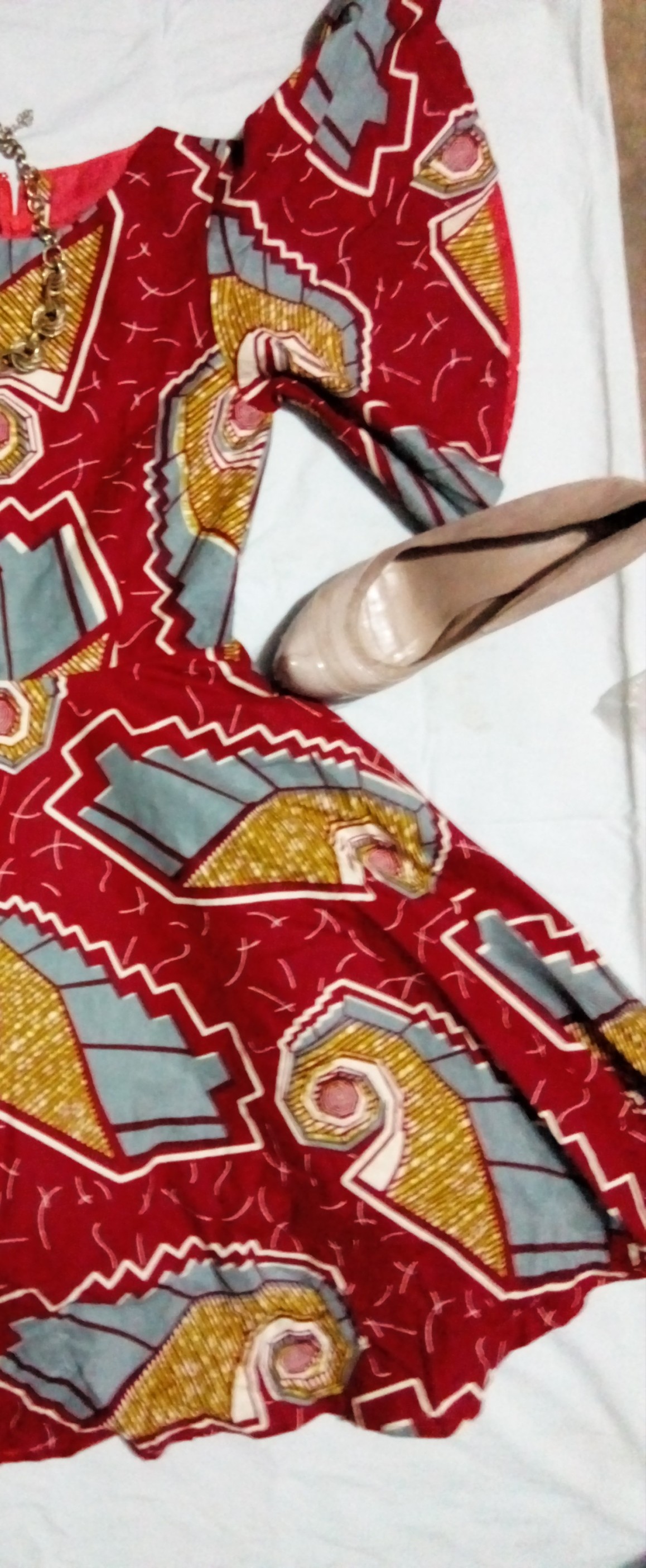

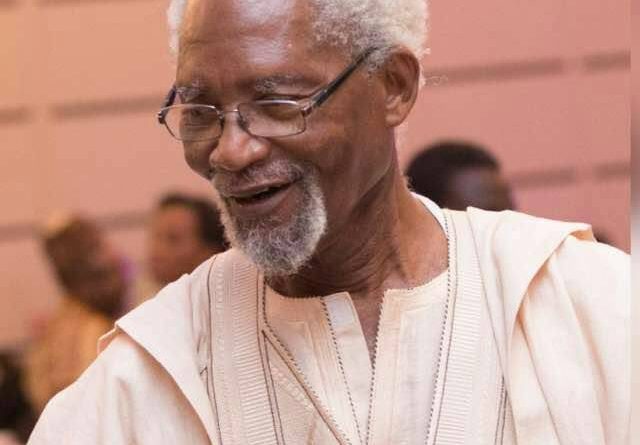


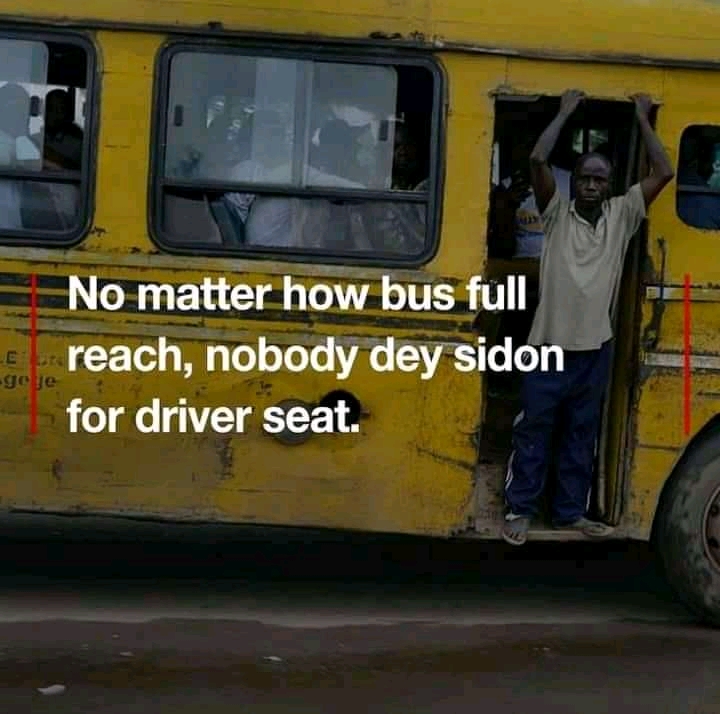
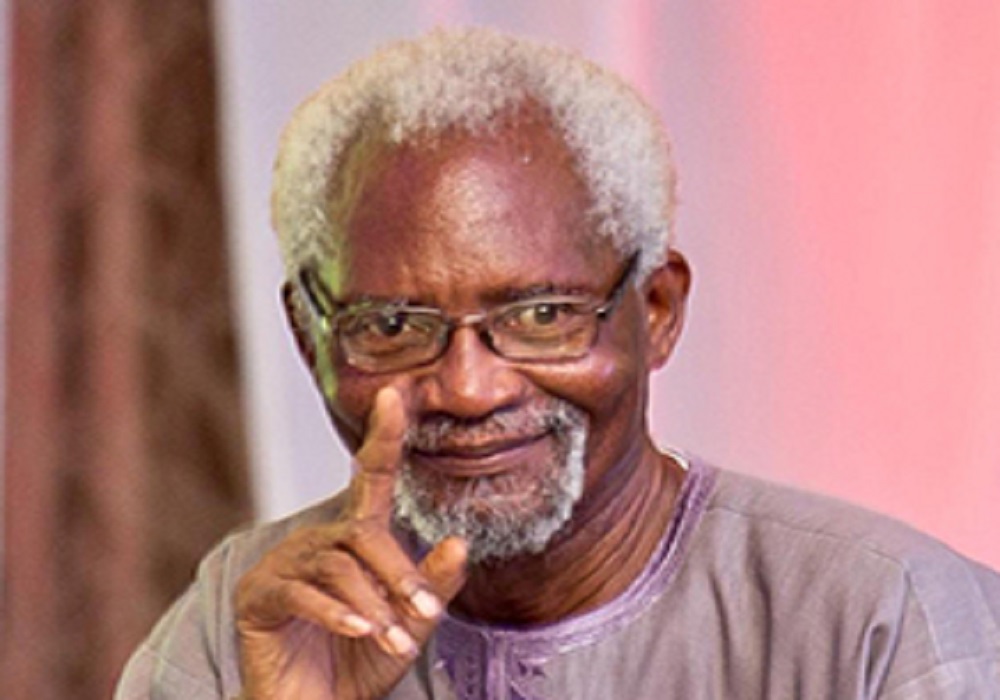
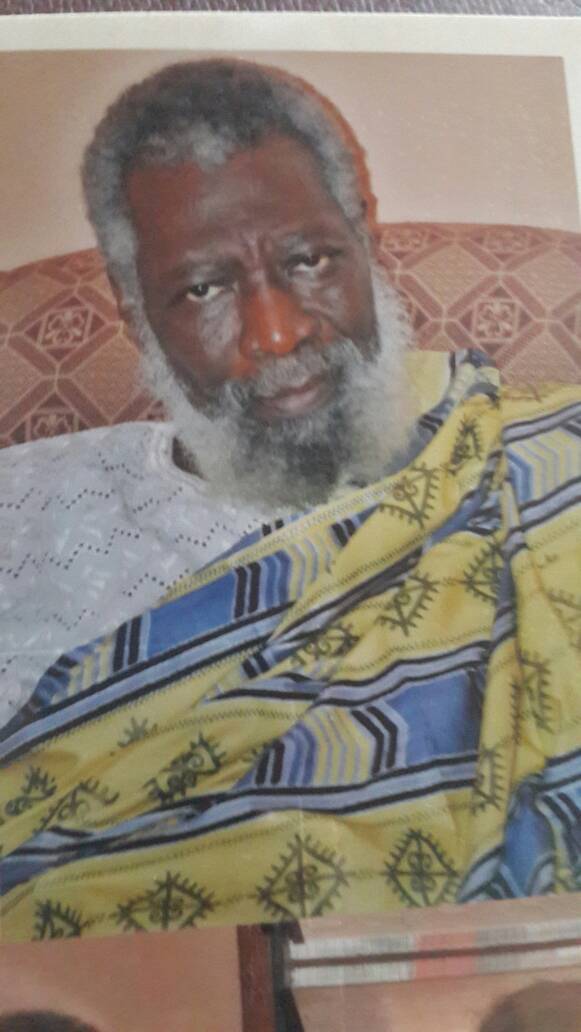
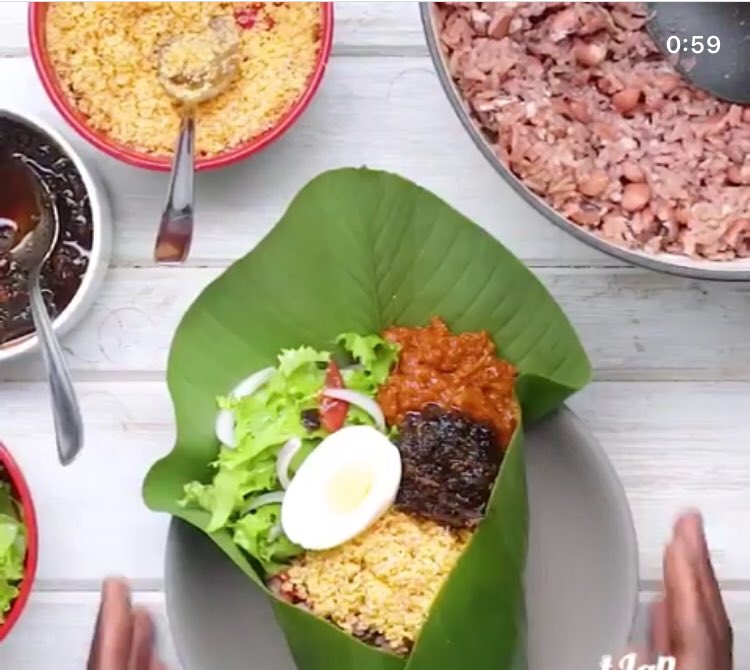

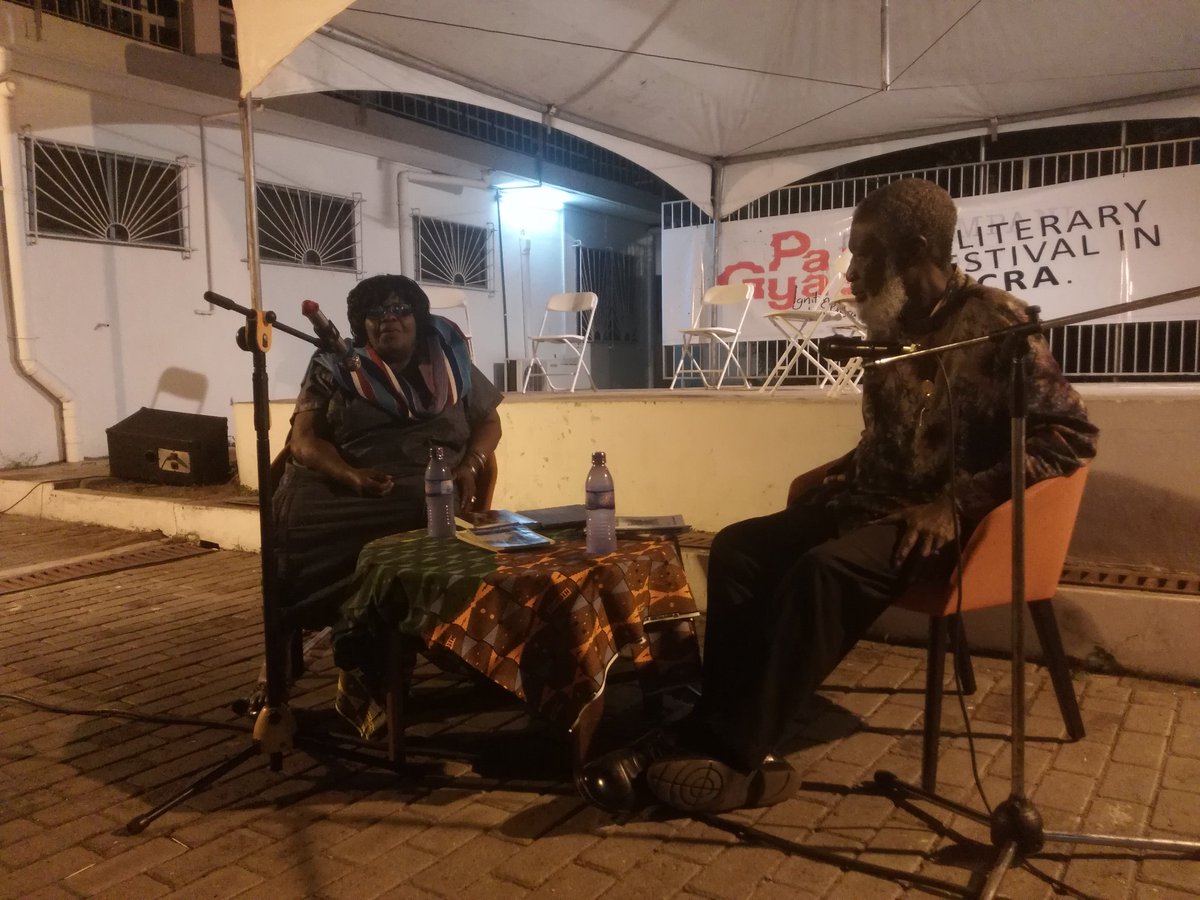







 And per one thread of the freely flying chunks of advice, the recommended presidential candidate is God’s-own-chosen-one-cum-the-king-of-peace.
And per one thread of the freely flying chunks of advice, the recommended presidential candidate is God’s-own-chosen-one-cum-the-king-of-peace. Your name, status, reputation and some, can, within the click of a tongue, be beaten down into the typical three-letter abbreviation of a political party’s name.
Your name, status, reputation and some, can, within the click of a tongue, be beaten down into the typical three-letter abbreviation of a political party’s name. Like this story of this young man who went seesawing on a motorbike and shouting ‘Yɛ kɔ y’enim’, around the Rawlings Park at Accra?Oh, he was lynched like a thief would have been, for outstepping his boundaries, Kantamanto, with his unwanted opinion in the air.
Like this story of this young man who went seesawing on a motorbike and shouting ‘Yɛ kɔ y’enim’, around the Rawlings Park at Accra?Oh, he was lynched like a thief would have been, for outstepping his boundaries, Kantamanto, with his unwanted opinion in the air. I could imagine how this man would further vent his hurt self on his wife at home. His wife would pass the venom on to the house help, and the house help, to the child. The child,to the dog.
I could imagine how this man would further vent his hurt self on his wife at home. His wife would pass the venom on to the house help, and the house help, to the child. The child,to the dog.

 No, I had not meant to be mad. Poor me had only been too raw and mad with happiness: Ghana had just scored a goal in the then African Cup of Nations.
No, I had not meant to be mad. Poor me had only been too raw and mad with happiness: Ghana had just scored a goal in the then African Cup of Nations.